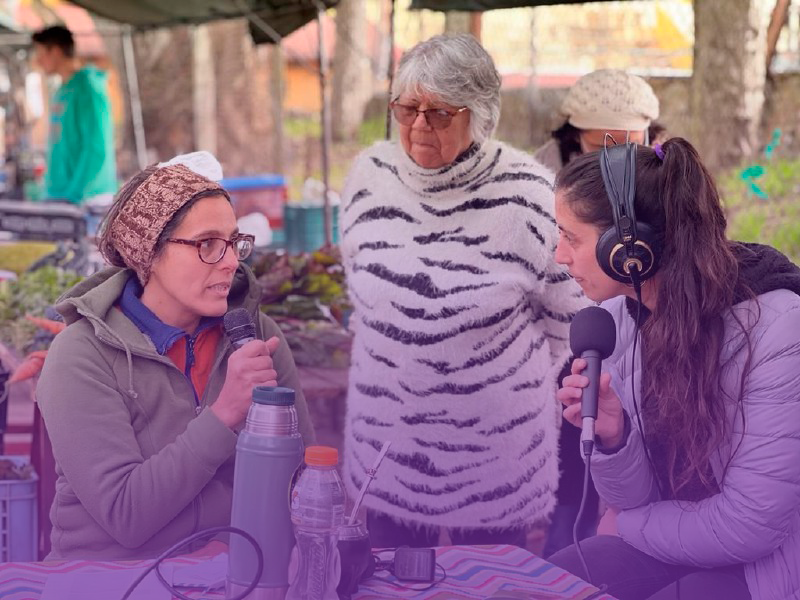If there is something about grassroots feminist communications is that we are constantly learning from the exchange between one another. Real World Radio is an outlet that is part of Friends of the Earth International. And in this task of exchanges, this collaboration-oriented view, building trust along this nearly two-decade journey with the World March of Women—and now with Capire as well—has been essential.
The World March of Women has been crucial to conceive the framework of Gender Justice and Dismantling Patriarchy of Friends of the Earth International. It has also been fundamental for Real World Radio’s reflections on grassroots communications. Today, for us, Capire is a huge reference.
Our joint work has been going on for a while and it has become stronger thanks to a number of aspects. It is always good to look back and bring back a piece of history. History is always a good way to bring us to the present and let us know, for example, that we worked together in the Media Convergence in 2012, when there was already an agreement to follow collaborative logics. The collaboration between means of communications is a fundamental issue for grassroots communications. This pathway has become deeper and stronger to this day. Now, since 2015, we are together on Continental Day for Democracy and Against Neoliberalism.
After this brief presentation, which I consider relevant to situate where we are today, I will address some points or topics that we have built together along this road, and of which we cannot lose sight. They must be present and we must work on them when planning grassroots feminist communication strategies. As we have seen, we have accomplished things, but we cannot get distracted. I will then share a list with eight points that I consider to be relevant for our work as communicators:
#1 Cross-sectional feminist perspective
One of the main challenges we face to avoid losing sight of the political strategy in grassroots feminist communications remains to imprint a feminist and territorial perspective on all topics we address, whether they are about the economy, politics, culture, the environment, elections, or everyday life. It is important to highlight that this is one of our challenges, although we have made great advances. If we work on that, putting our efforts and our attention to it, we can prevent reducing the participation of women and gender and sexual nonconforming groups to one field of action—on the contrary, we will be able to expand it and show it across political realms.
#2 Empathy to expose violence
To be able to show and expose the different layers of violations and forms of violence that affect the bodies of women and nonconforming people, especially at the bases of society. It is an exercise of empathy: to understand that, within patriarchal and neoliberal systems, we can see several layers of violations—sexism, colonialism, racism, elitism, ableism, adultcentrism, gerontophobia, fatphobia (or fat hatred), and the list goes on. I think this is a fundamental exercise for grassroots feminist communications.
#3 Look at power
To understand that, behind every conflict, there are power relations. The patriarchal system has essentially asymmetric power relations that are unfair to women, so we must not convey one thing as the sole cause behind what we report.
#4 Bring more grassroots voices
To bring more voices, knowledge, and experiences from the grassroots, from the bases, and not just continue with the same voices and sources that have been consolidated. To expand, beyond so many voices that we can feature, from analysts, experts, and scholars, grassroots voices are essential, as they effectively give meaning to grassroots communications. With that, based on specific stories and personal experiences, we can denounce a structural and systemic reality. Because the personal is political. That is, it is not about telling isolated cases, but rather about being able to tell a story that represents or is the consequence of a large system.
#5 Communicate to change
We narrate structural inequalities in our societies not only to inform or generate content, but so that one day they will no longer exist. This should be reflected on the tone of our communication. We communicate, narrate stories, tell realities to promote change. Our goal is not only information, but transformation, warning, denunciation. Moreover, we are faced with the great challenge of encompassing several regions (something Capire does very well), and having people own community communication projects, relate to them, be part of them.
#6 Show struggles through dignity, not revictimization
We must make an effort not to fall into revictimization, but rather feature the struggles. The struggles that women wage are often hard and not joyful at all. But we must exercise a way of showing these struggles through dignity—which is what the struggle gives us after all. It is the dignity of wanting to change everything that is not good, and which may be quite difficult to watch and listen to.
#7 Do collective communications
Grassroots feminist communications must be collective, always. It is the only way it can be. I believe that changes in contexts and the struggles we build from feminisms have opened several doors, and now we have the opportunity—which has been denied to us for a long time—to promote exchanges, organize, coordinate, think, and do things together. It is a possibility of getting to know each other, support, promote, recommend, and consult one another based on love, care, and the rebelliousness of grassroots feminism. A network-based communication weaves possibilities.
#8 Promote grassroots feminist memory
The way memory is built is also sexist, white, and capitalist. Both in grassroots feminism and communications, we must see ourselves as part of a history. Grassroots feminist memory is vital. I always mention a study conducted by our sister María Noel Sosa González, called “De laorfandad al linaje” [“From Orphanhood to lineage”]. This means we must not see ourselves as orphans, but rather as participants of a history. There is a history of grassroots feminist communications. We must look for it, bring it to the fore, remember it, acknowledge this path, who first tread it, and how we got here. I believe that it is always important to follow the steps of those who walked before us, so that, somehow, we can change what comes ahead.
____
Valentina Machado is a feminist activist with an undergraduate degree in Communication Science and a graduate degree in Social Media Management. She is a member of the communication collective Radio Pedal and the Communication team of REDES—Friends of the Earth Uruguay. She is a journalist at Real World Radio.
This article is an edited version of her contribution during the webinar “Political Strategies of Grassroots Feminist Communications,” held by Capire on July 5th, 2022. You can also read or listen to the contributions by Ama Pratt, Anuka Vimukthi, and Marilys Zayas.




